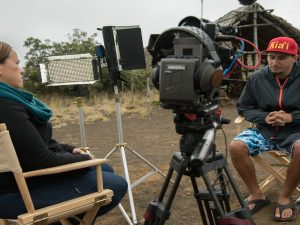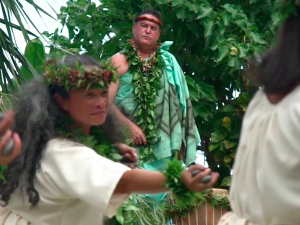Ua kaʻanalike mai ʻo John McHugh, kekahi lālā kōmike a alakaʻi o ka Agriculture Leadership Foundation of Hawaiʻi, ma ka Hawaiʻi Agriculture Conference ma ka lā 20 o Kepakemapa, 2012, “Ua hoʻokumu ʻia kēia e ka Agriculture Leadership Foundation of Hawaiʻi. Ke hoʻāʻo nei mākou e kūkā e pili ana i nā kumuhana o kēia au a ʻimi i nā manaʻo ʻokoʻa i mea e hiki ai i nā kānaka mahiʻai ke hoʻoulu manaʻo. No laila, ke ʻākoakoa mai nei ka poʻe o ka honua me ka manaʻo e hoʻoulu manaʻo a noʻonoʻo i nā ala ʻokoʻa o kēia ʻano ʻoihana.
ʻOiai ʻike kākou i ka waiwai o ka mahiʻai, ke kanaka hoʻoulu meaʻai, hiki ke ʻike pū ʻia ka waiwai o ke kanaka kuke meaʻai. Nāna nō e makaʻala a hoʻomākauka i ka meaʻai a i ka ʻai ʻana o ka poʻe i ia mea. A ma kēia hānana nō i loaʻa nā kuke like ʻole; kekahi o lākou, ʻo ia hoʻi ʻo Mark “Gooch” Noguchi.
Wahi a Noguchi, “Koho au e komo i ka Ag Conference ma muli o ko kākou nohona ma ka mokupuni. ʻAʻole nui nā lako pono, no laila ʻ inā ua hiki iā kākou ke kaʻanalike manaʻo, ʻo ia ko kākou kuleana. ʻOiai ʻo kākou ka poʻe o Hawaiʻi, ʻo ia hoʻi ko kākou kuleana; ʻaʻohe hōʻole ʻana.”
“Makemake kākou e kālele i ko kākou kākoʻo ʻana i nā ʻano hana mahiʻai like ʻole. He waiwai ko lākou mau ʻano a pau.” Wahi a McHugh.
Me ka manaʻo o ke kuke ana ma o ka ahupuaʻa, ua kaʻanalike ʻo Mark i ka waiwai a me ka pilina o Uka me Kai ma o ka ʻoihana mahiʻai o ka Hawaiʻi.
“Komo ko kākou kaiaulu i ka hana a kēia mau mahiaʻi. No kākou a pau ka hopena maikaʻi me ka ʻole. Inā pilikia ka ʻāina pilikia, pilikia kekahi, pilikia kākou a pau.” Ua hele kākou a maʻa i ke kuanaʻike a nohona Haole. No laila, ua poina kākou, ʻo ka hopena o ko Uka, ʻo ia pū an aka hopena o ko Kai.”
Wehewehe hou mai ʻo Mark, i loko nō o kona koko Hawaiʻi ʻole, mau nō ka waiwai e aʻo a kaʻanalike i ka ʻike ma waena o ka poʻe i mea e hōʻoia ai ke ola o ia ʻike no nā hanaunā e hiki mai ana.
Wahi a Mark, “Ke hoʻāʻo mau nei au e makaʻala i koʻu kaiaulu. ʻAʻole hiki iaʻu ke wehewehe maoli i ke ʻano mai ka Hawaiʻi, akā koʻu kuhi, he moʻomeheu a manaʻo a nohona e ʻaneʻane hala ana. No laila, no ka poʻe ʻike ke kuleana o ka hoʻoilina. Noʻu ke kuleana, ma ke ʻano he kanaka kuke, e lawe i ke aʻo, mālama a hoʻoili aku. Inā ʻaʻole, e hala ana.”
Makemake nā mahiʻai, he aha lā ke ʻano o ko lākou mahiʻai ʻana, e hōʻoia i ka hoʻomau ʻia ʻana o kēia hana i loko o nā makahiki he ʻumi, he iwakālua paha; ʻo ia ke ola maoli ʻana.
[/spb_tab] [spb_tab title=”English”]
John McHugh, Committee member and Director of the Agriculture Leadership Foundation of Hawaii, shared with us at the Hawaiʻi Agriculture Conference on September 20, 2012 that, “This Ag Conference is put on by the Agricultural Leadership Foundation of Hawaiʻi. What we try and do is present topics that are timely in nature and that push the envelope a bit and give the farmers an opportunity to think outside of the box. So we’re bringing people from different parts of the world to deliver a message that can be inspirational and help us think in and act and conduct business in a very different way.”
Understanding the importance of farmers, we also see how chefs play a significant role in handling and serving food. Thus, chefs were also in attendance at this event, one being Mark “Gooch” Noguchi.
Noguchi says, “I chose to be a part of the Ag Conference because we live on an island. We have finite resources so, for those of us that have the ability to share our manaʻo. It our kuleana, and is our responsibility to do, as people of Hawaiʻi; then you cannot say no.”
“What we want to emphasize is within this conference is that we support all types of agriculture. Whether it’s conventional, organic or biotech agriculture; there is a place for all of it.” says McHugh.
Through the idea of cooking within an ahupuaʻa, Mark shared the significant relationship of Uka and Kai within Hawaiian agriculture.
“Our community; us, kākou, invest in a farm or a group of farmers. So we all share the risk, therefore, if weather happens and Mother Nature decides to do something funny, then the loss is bled out on the community because what affects one affects all. We become accustom, we come inundated in Western society. So then, we forget, we forget that what happens up there, affects down there.”
Although not a Hawaiian, Mark expresses the importance of sharing and perpetuating this knowledge for the future generations.
Mark says, “I’m actively aware of the community I live in. From, a Hawaiian perspective, I cannot speak, I can only guess, already it’s a culture and an idea and a way of life that is being lost. So therefore, anybody that is aware it’s your obligation to perpetuate it. It’s my obligation as a professional cook, as a chef, to take what I’ve learned and pass it forward. If we don’t do that it’s gone.”
“All the farmers, no matter what it is they’re doing, they want to make sure that what they do today, they will be able to do ten years from now, or twenty years; it’s what we call sustainability.” says McHugh.
And as we discuss more on this topic of agriculture, we can ensure this very goal. I am Kuʻulei Bezilla with ʻŌiwiTV, aloha.
[/spb_tab] [/spb_tabs]

